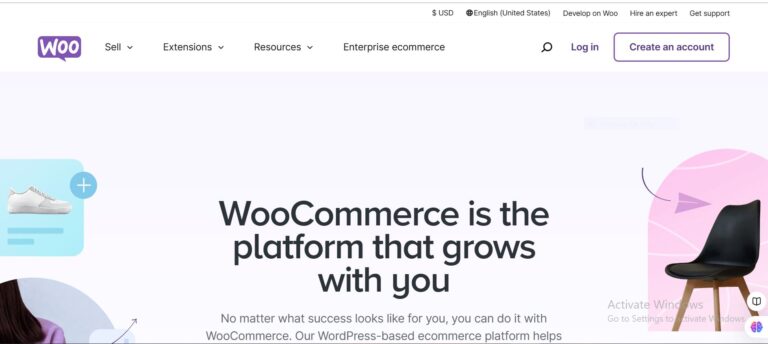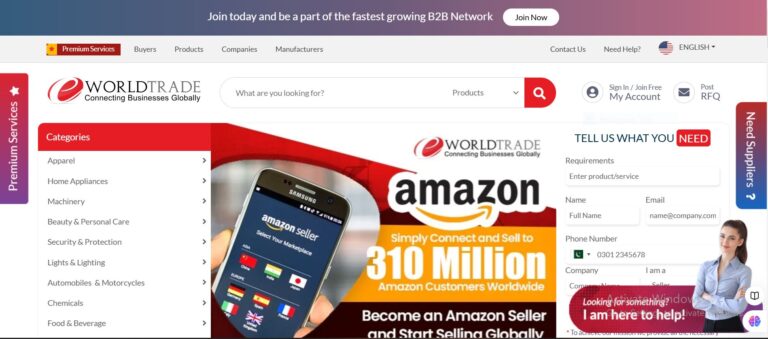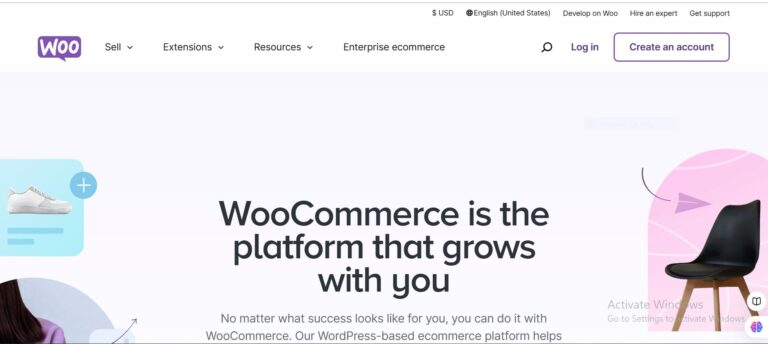When I first decided to dive into the world of e-commerce, I was overwhelmed by the vast array of options.
While making a website there are many options of e-commerce platforms but to choose the best is the difficult task. To get the right e-commerce platform that provides everything I need I must have known about the best options of e-commerce platforms.
This article will help you choose the ideal e-commerce platform for your needs. For that first take a view at the difference between e-commerce website and e-commerce platform.
What is eCommerce website?
An e-commerce website is an online platform that enables businesses and individuals to purchase and sell products or services via the Internet. These websites enable users to browse products or services, add them to a virtual shopping cart, and complete transactions using various payment methods (such as credit/debit cards, PayPal, or digital wallets). Example: An online store you visit to buy products, like Nike.com or Apple.com.
E-commerce websites can range from small businesses with a few products to large platforms like Amazon, eBay, or Alibaba, which host thousands or millions of sellers and products.

What is eCommerce platform?
An e-commerce platform is a technological solution that enables businesses to set up and monitor their online store or marketplace. These platforms provide the infrastructure and tools needed to sell products or services over the Internet. Unlike individual e-commerce websites, which are often customized for specific businesses, an e-commerce platform offers a more streamlined, user-friendly way for businesses to set up, operate and grow their online sales.
E-commerce platforms simplify the process of creating and managing online stores by providing a variety of built-in tools, allowing businesses to focus on selling, marketing and developing their brand. Permission is granted.
Difference between eCommerce website and eCommerce platform:
- Scope of E-Commerce Website: A website is only one part of an e-commerce business. It pays attention on the front-end experience for users.
- Scope of E-commerce platform: This platform covers the entire back-end infrastructure, including inventory management, payments, security, and data analytics.
- An e-commerce website is the ultimate store for customers to shop.
- An e–commerce platform is the tool or service that a business uses to build and manage a website, providing all the necessary features and infrastructure.
- In short, an e-commerce platform provides the tools necessary for a business to create and operate an online store. Without such a platform, launching and managing an e-commerce site would be significantly more challenging and resource-consuming.
Some common eCommerce platforms:
Overview: Shopify is one of the most popular e-commerce platforms for building online stores. It is recognized for its user-friendly interface, flexibility and extensibility. Shopify offers a diverse selection of themes and apps, making it ideal for businesses of any size.
Features:
- User-friendly interface, no coding required.
- A wide range of customizable templates Integrated
- Payment Processing (Shopify Payments)
- SEO and marketing tools 24/7 customer support.
Best for: Entrepreneurs, small to medium businesses, and businesses looking for a quick setup.

Overview: WooCommerce is an open source plugin for WordPress that turns a WordPress site into a fully operational e-commerce store. It offers extensive customization options and is perfect for users who are experienced with WordPress.
Features:
- Integrates seamlessly with WordPress.
- Highly customizable with multiple themes and plugins
- Supports a wide range of payment gateways.
- Wide shipping options
- Free basic version, but many advanced features require paid plugins
Best for: Small to medium businesses, WordPress users, and those who want complete control over customization.

Overview: Wix is a website builder tool that provides e-commerce features. It is known for its drag-and-drop interface, which makes it a great choice for startups and small businesses.
Features:
- User-friendly drag and drop builder Mobile-responsive design
- Wide selection of templates
- Payment gateway integration (PayPal, Stripe)
- Basic e-commerce tools such as inventory management
Best for: Small businesses, startups, and consumers who want a simple, affordable e-commerce solution.
Overview: Amazon is the world’s largest online marketplace and a leading e-commerce platform, enabling businesses of all sizes to sell products to a global audience. While Amazon is primarily known for its retail operations, it also allows third-party sellers to list their products through the Amazon Marketplace. .It offers and promises a range of services, tools, and features designed to help businesses of all sizes succeed in e-commerce.
Amazon’s platform provides a comprehensive e-commerce ecosystem that includes product listing, payment processing, inventory management, fulfillment services, and marketing tools. It serves both individual sellers and large enterprises, allowing them to reach millions of customers worldwide.
Features:

- Mass audience: Amazon’s marketplace gives sellers access to millions of potential customers worldwide, increasing sales opportunities.
- Logistics Support: With Fulfillment by Amazon (FBA), sellers can outsource most logistics tasks to Amazon, making it easy to scale.
- Trust and credibility: Amazon’s reputation for customer service and security benefits sellers, as customers are more likely to buy from a trusted platform.
- Convenience: Sellers can quickly list products without the need to create a website or handle payment processing themselves.
- Marketing and Promotion: Amazon’s advertising tools and promotional features help sellers gain visibility and increase sales.
Amazon is an incredibly powerful e-commerce platform that offers sellers significant opportunities to reach a global audience. Its ease of use, wide customer base, and strong support services make it an attractive option for entrepreneurs and established businesses. However, sellers must be aware of fees, increased competition, and limited brand control. For those who want to take advantage of Amazon’s wide reach and are willing to navigate the complexities of the platform, it can be a great choice to grow their business.

Overview: BigCommerce is a SaaS (Software as a Service) platform that offers a more robust and scalable solution for e-commerce. It is ideal for growing businesses that need advanced features and multi-channel selling.
Features:
- Built-in marketing tools like SEO, email marketing, and social media integration
- Multi-channel selling (eg, on Amazon, eBay, Facebook)
- Advanced analytics and reporting
- No transaction fees on any plan.
- Support for B2B and B2C
Best for: Growing businesses, medium to large enterprises, and businesses aiming for international expansion.

Overview: Weebly is another website builder that offers e-commerce functionality. It is designed to be user-friendly and is a good choice for users who want to quickly create a store without much technical knowledge.
Features:
- Drag and drop website builder
- Built-in e-commerce tools for inventory management, order processing, and shipping
- Integrated payment gateways SEO and marketing tools
Best for: Small businesses and individuals who need a simple and cost-effective solution to sell products online.

Overview: Alibaba.com is one of the world’s largest online business-to-business (B2B) e-commerce platforms, connecting buyers and sellers from around the world. Founded in 1999 by Jack Ma and a group of co-founders, Alibaba.com is part of the Alibaba Group, a Chinese multinational conglomerate specializing in e-commerce, retail, Internet and technology. Alibaba is playing an important role in helping small businesses access global markets, creating new opportunities for entrepreneurs around the world. Alibaba.com is a leading platform for global commerce, offering a wide range of products, seamless international transactions, and tools that empower businesses worldwide.
Features:
- Supporting Small and Medium Enterprises (SMEs)
- Promoting e-commerce
- Global market access
- Wide range of products
- Protection for buyers
- Custom orders
Best for: Alibaba.com offers millions of products across various categories including electronics, clothing, machinery, home appliances, chemicals, and more.

Overview: eWorldTrade is a global B2B (Business to Business) e-commerce platform that connects suppliers, manufacturers and buyers from around the world. It focuses on facilitating international trade, allowing businesses to find suppliers, buyers and manufacturers for a wide range of products across a wide range of industries. Like platforms like Alibaba, eWorldTrade aims to bridge the gap between small and medium-sized enterprises (SMEs) and global markets.
Features:
- Request for Quotation (RFQ)
- Supplier Directory
- Global access
- Secure transactions
- Custom orders and product sourcing
- Business Networking
Best for: eWorldTrade is a growing and valuable B2B platform that helps businesses find global suppliers, negotiate prices and buy in bulk. It is particularly suitable for small and medium-sized enterprises (SMEs) seeking access to international markets and cost-effective suppliers.

We have learnt about eCommerce platforms , but while using these platforms we need eCommerce Website Builders , which are mostly integrated into these platforms. Here is about eCommerce Website Builders:
eCommerce Website Builders
Ecommerce website builders are platforms or tools that allow individuals and businesses to create, customize, and launch online stores without the need for extensive coding or technical skills. These platforms provide ready-to-use templates, drag-and-drop interfaces, payment integrations, and various features to make the online store simple and efficient.
Most commonly used eCommerce Website Builders:
Wix is a website builder known for its flexibility and easy-to-use drag-and-drop editor. With Wix eCommerce, you can create a fully functional online store with a variety of templates and customization options.
Key Features:
- Drag and drop builder for easy design
- Mobile-optimized websites
- Multiple payment gateways (PayPal, Stripe, etc.)
- Built-in marketing tools (email campaigns, SEO, social media tools)
- 24/7 support
- Wide range of templates and apps for additional features

BigCommerce is a cloud-based e-commerce platform designed for scalability and growth. It is ideal for businesses that plan to expand rapidly and need advanced features right from the start.
Key Features:
WooCommerce is an open source e-commerce plugin for WordPress, which enables you to transform any WordPress website into a complete and functionally stable online store. It offers many customization options with hundreds of themes and plugins.
Key Features:
- Flexible and open source platform
- Huge library of themes and extensions
- Payment Gateways Support (PayPal, Stripe, etc.)
- Inventory and order management tools
- Ready to use blogging capabilities (since this is a WordPress plugin)
- SEO friendly features for better search ranking

Conclusion:
Each of these platforms has its own strengths and is suited for different types of businesses. Consider factors such as ease of use, features, customization, and scalability when selecting an e-commerce website builder for your business. So while choosing the platform keep in mind the all keys points of that platform for online success.



